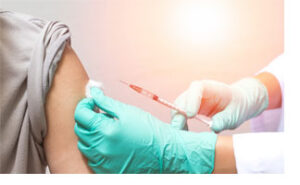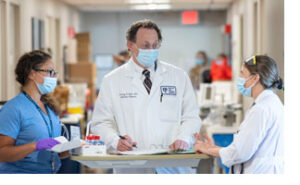
A late-stage clinical trial is now underway at Brigham and Women’s Hospital to test a vaccine candidate for preventing COVID-19. The Brigham is the only hospital in New England to serve as a clinical research site in the phase 3 COVE study. The study is designed to evaluate the effectiveness and safety of the vaccine, mRNA-1273, and its ability to prevent COVID-19 illness.
“This was the first phase 3 trial in the U.S. to test the effectiveness of a vaccine against COVID-19, and the Brigham worked diligently across industry, academia and government to help launch this trial rapidly and safely,” said Lindsey Baden, MD, director of the Center for Clinical Investigation (CCI) at the Brigham, and one of three co-principal investigators in the national study. “Our goal has been to not only launch this important trial, but also to develop a rapid, high-quality process for vaccine trials that are to come.”
The Brigham Chosen for Clinical Research Experience
For 20 years under Dr. Baden’s leadership, the Brigham has been part of the HIV Vaccine Trials Network (HVTN). Funded by the National Institutes of Health (NIH), the HVTN encompasses a global network of sites conducting clinical studies related to HIV vaccine development.
In response to the COVID-19 pandemic, the NIH brought together the HVTN and several other NIH-funded clinical trial networks to answer important questions under the COVID-19 Prevention Network (CoVPN). Early in the pandemic, CoVPN leadership chose Dr. Baden to be co-principal investigator of the mRNA phase 3 vaccine trial based on his clinical research experience and his knowledge of COVID-19.
 Lindsey Baden, MD, (center) is an expert in the development of novel diagnostics and therapeutics for viral diseases that affect high-risk patients to a larger extent. Dr. Baden is also the vaccine clinical research site leader at the Harvard HIV Vaccine Clinical Trials Unit and the program director for the Hub and Network elements of Harvard Catalyst (CTSA Award) at Harvard Medical School.
Lindsey Baden, MD, (center) is an expert in the development of novel diagnostics and therapeutics for viral diseases that affect high-risk patients to a larger extent. Dr. Baden is also the vaccine clinical research site leader at the Harvard HIV Vaccine Clinical Trials Unit and the program director for the Hub and Network elements of Harvard Catalyst (CTSA Award) at Harvard Medical School.
mRNA-1273 Vaccine Employs New Genetic Technology
At present, more than 100 vaccine candidates are being developed by scientists all over the world. Many leading experts have confidence in mRNA-1273, which works by injecting tiny portions of genetic code into the body to instruct cells to produce antigens against SARS-CoV-2, the virus that causes COVID-19. Of the 100 candidates in development across the world, several use this method of vaccination.
“No vaccine has been approved using this approach, but nucleic acid technology (RNA/DNA) is attractive due to the relative simplicity of design and manufacturing,” says Dr. Baden. “However, proof of clinical efficacy is needed to enhance development strategies.”
The mRNA-1273 vaccine, manufactured by Moderna, Inc., is one of five candidates to reach phase 3 clinical trials using this type of genetic technology—and the first in the U.S. In a phase 1 trial, the mRNA-1273 showed encouraging immune responses in 45 healthy adults. These results appeared in the New England Journal of Medicine (NEJM). Two weeks later, results showed evidence that mRNA-1273 was effective in non-human primates. Results also appeared in NEJM.
Phase 3 COVE Trial Underway at the Brigham
The phase 3 COVE trial is a double-blind, placebo-controlled study that seeks to enroll 30,000 people across 99 sites. Each participant will receive mRNA-1273 or the placebo in two intramuscular injections, 28 days apart. Participants will be followed for up to two years after the second dose of the vaccine.
The trial is required to enroll individuals at higher risk for complications from COVID-19. This includes adults over age 65, and those younger than 65 with a health condition that puts them at a higher risk for diseases, such as diabetes or heart disease.
During the clinical trial of mRNA-1273—and other phase 3 trials under Operation Warp Speed (OWP)—trial participants who get the vaccine candidate at the Brigham will not be exposed to the virus. mRNA-1273 doesn’t contain the live virus—it’s an mRNA construct, meaning participants will not be infected with COVID-19.
“The only way a participant can contract COVID-19 is through interactions in their community,” said Dr. Baden. “We hope the vaccine will decrease the risk of acquiring COVID-19 from ordinary interactions at work or home, or that the vaccine will decrease the severity of symptoms.”
Evaluating Trial Participants for COVID-19 Infection
If a participant develops cold or flu-like symptoms after getting the vaccine, they will be tested for COVID-19. Presumably, those who receive the experimental vaccine will be less likely to catch the coronavirus than the group receiving the placebo.
To detect asymptomatic infections, participants will undergo several blood draws to detect the presence of antibodies against the coronavirus. Researchers will also evaluate participants for side effects, such fatigue, muscle pain, headache, chills, or pain at the injection site.
“We’ve only known about COVID-19 since December of 2019,” said Dr. Baden. “Consequently, it’s difficult to predict far into the future. We don’t have efficacy data in humans yet. We need research to understand how these vaccine candidates may illicit immune responses and protect from illness.”
Accelerating Development While Prioritizing Safety
While initial data hasn’t found safety concerns with the mRNA-1273 vaccine, monitoring for safety considerations will be an ongoing process as tens of thousands of people are vaccinated and followed in the COVE study and others.
“We’re performing clinical trials safely while moving quickly and taking financial risks,” said Dr. Baden. “We could save years in the development process by manufacturing millions of doses of the vaccines being studied in Operation Warp Speed while developing the efficacy data. It’s a modest risk in the context of a trillion-dollar catastrophe, but, as always, the data is our guide.”
Most experts hope that these large-scale phase 3 vaccine trials will lead to a rigorously validated and safe vaccine that will be widely available in 2021. To meet this goal, industry, government, hospitals and academia are using strategies to shorten the vaccine development timeline without compromising safety.
“No one has ever developed a vaccine this fast,” said Dr. Baden. “But given the magnitude of this pandemic, we can’t go fast enough. We are shortening timelines in unprecedented ways. While we are working quickly, we will not compromise on safety. We must be cautious until we have enough safety and efficacy data.”
Disclosure: To ensure public trust in the phase 3 COVE vaccine study, Betsy Nabel, MD, president of Brigham and Women’s Hospital, resigned from the Moderna board when she realized that her involvement could be perceived as a conflict of interest and cast doubt on the validity of the trial’s process and outcome. Learn more.